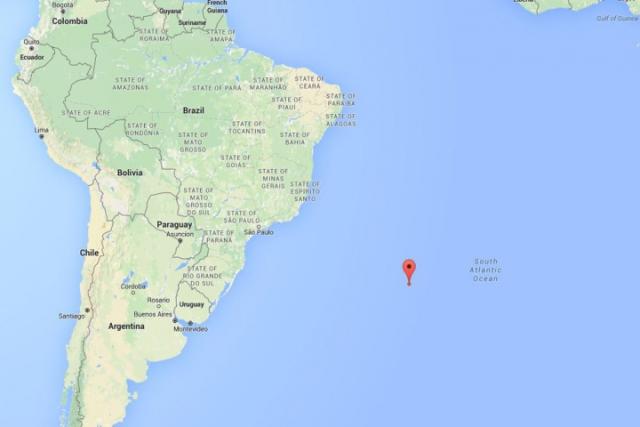| Topic: meteor explodes over the atlantic | |
|---|---|
|
A meteor that exploded over the Atlantic on Feb. 6 had more force than the Hiroshima bomb
Rick Stella,Digital Trends 15 hours ago Comments Like Reblog on Tumblr Share Tweet Earlier this month, folks detecting atmospheric explosions for the United States government noticed something a bit out of the ordinary off the coast of Brazil. At roughly 2 p.m. UTC on February 6, a wayward meteor measuring roughly the size of a small living room entered Earth’s atmosphere and — while traveling over 34,000 miles per hour — exploded with an incredible amount of force. How much force, you ask? Think 13,000 tons of exploding trinitrotoluene (TNT), or more energy than what was given off by the atomic bomb detonated over Hiroshima. According to recent data released by NASA’s Near Earth Object Program, the meteor was located some 1,150 miles southeast of the Brazilian city of Rio de Janeiro, essentially in the middle of the Atlantic Ocean. As it careened downwards, the object rapidly burned up and eventually exploded roughly 19 miles above the surface of the ocean. While the energy exerted will certainly raise eyebrows, rest assured, occurrences of this nature happen quite often and sometimes pack even more energy — e.g., the Chelyabinsk fireball in February 2013 released roughly 500,000 tons of TNT. 
An approximate location of where the meteor exploded “The Earth is bombarded by debris from space to the tune of about 100 tons every day,” says Slate’s Phil Plait. “Most of the stuff is quite small, like the size of a grain of sand or smaller, and burns up 100 kilometers or so off the ground.” Related: Astronomers detect atmosphere of a distant, diamond-like super-Earth for first time Unfortunately for this latest event, the likelihood of anyone capturing the explosion on photo or video remains scarce considering it’s distant location off the coast of Brazil. Detection of the blast likely resulted from a combination of satellite imagery, atmospheric microphones, and seismic monitors, so even the people who initially stumbled upon this finding only had a series of data readings to work off of. What’s maybe most chilling is the fact NASA (or any other agency, for that matter) has yet to perfect a method for detecting such meteors more than a few hours prior to impact. Though none have yet to pose a serious threat, the Chelyabinsk fireball did create a bit of a frenzy when it exploded in 2013, shattering a slew of windows which in turn caused injuries for more than 1,000 nearby civilians. NASA did recently open a facility whose sole purpose is to canvas space for asteroids bound for Earth, so perhaps it’s only a matter of time before events like these are known before they happen instead of weeks after. posted here |
|
|
|
|
|
All through the history of the earth there have been major asteroid impacts that have altered and even destroyed much of the life on our planet.
The meteor in question is tiny in comparison to others that have exploded or impacted us and yet can still create a significant explosive force. It is inevitable that in the relatively near future we will face another major impact from a comet or asteroid that will have severe life threatening consequences. Makes you wonder why so many are concerned with "global warming" when an asteroid impact will do much greater damage then anything man can throw at us. |
|
|
|
|
|
All through the history of the earth there have been major asteroid impacts that have altered and even destroyed much of the life on our planet. The meteor in question is tiny in comparison to others that have exploded or impacted us and yet can still create a significant explosive force. It is inevitable that in the relatively near future we will face another major impact from a comet or asteroid that will have severe life threatening consequences. Makes you wonder why so many are concerned with "global warming" when an asteroid impact will do much greater damage then anything man can throw at us. ( But yet war continues on. I'd look at the sky at night after winning at slots in Vegas and think to myself what a wonderful world. And see incoming objects, to small to make out, burning up and disappearing, hundreds of feet. And never touching the ground ). Didn't Nostradamus predict this in his time? As well as the Internet coming to be , and massive earthquakes, food shortages was coming. Hiding it in his quatrains, or notes to keep it safe, among other things? I think 'sink-holes' are forgotten. They can be just as bad, and cave in with no warning. And vary in size and depth. Just not as frequent. 
|
|
|
|
|
|
All through the history of the earth there have been major asteroid impacts that have altered and even destroyed much of the life on our planet. The meteor in question is tiny in comparison to others that have exploded or impacted us and yet can still create a significant explosive force. It is inevitable that in the relatively near future we will face another major impact from a comet or asteroid that will have severe life threatening consequences. Makes you wonder why so many are concerned with "global warming" when an asteroid impact will do much greater damage then anything man can throw at us. ( But yet war continues on. I'd look at the sky at night after winning at slots in Vegas and think to myself what a wonderful world. And see incoming objects, to small to make out, burning up and disappearing, hundreds of feet. And never touching the ground ). Didn't Nostradamus predict this in his time? As well as the Internet coming to be , and massive earthquakes, food shortages was coming. Hiding it in his quatrains, or notes to keep it safe, among other things? I think 'sink-holes' are forgotten. They can be just as bad, and cave in with no warning. And vary in size and depth. Just not as frequent. 
sink holes----results of energy weapons?? some of those evil geniuses are somewhat smart... |
|
|
|
|








